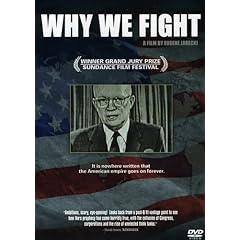Wednesday, September 06, 2006
Why We Fight
 I've been on a real documentary streak lately as one may notice if they look at the history in this blog. This is another very excellent documentary on America's imperialism - although the documentary seems to make the case that this militarism/imperialism is new (well, since WWII). I suppose that depends on your perspective, but that's neither here nor there.
I've been on a real documentary streak lately as one may notice if they look at the history in this blog. This is another very excellent documentary on America's imperialism - although the documentary seems to make the case that this militarism/imperialism is new (well, since WWII). I suppose that depends on your perspective, but that's neither here nor there. I'd suspect most average Americans wouldn't even like the phrase "American empire" (or American militarism/belligerance/etc.) at all, whether talking about post-WWII or not. However, as John McCain himself is quoted in the documentary - we have 725 military bases in 130 countries. What else do you call that? Let's do a little mind experiment, shall we? Let's take whatever the current boogeyman of America is - let's pick a semi-realistic one and not something like Iraq/Iran/North Korea - Then ask yourself what Americans and American institutions would call it if China had 725 military bases in 130 countries?
What if China spent more than all other militaries combined? What if China claimed and acted on certain exceptionalisms that it reserved to itself, such as unilateral, pre-emptive strikes against sovereign countries? What if China was the only country to have used nuclear weapons against civilian populations?
It's a good thought experiment, and obviously people are starting to think somewhat along these lines, at least when it comes to Iraq. Obviously they aren't thinking along lines that "extreme", but it looks like only a minority now supports Iraq, and many think it has nothing to do with the GWOT. So even in the terms that the spinners frame this war, it's not selling. Once people step outside those terms - like probing into what the definition of "terrorism" really is, for example - the framers of these debates can forget it anyway. But if they lose support while most people they are losing in the PR battle are still using their terms, that's really something.
Anyway, back to the movie - I really enjoyed how much time they spent on Eisenhower. To be sure, his exit speech is used by lots of documentaries - and even in the movie JFK, but rarely do we hear much about the man himself and how he came to openly discuss and warn against the "military-industrial complex". I found that part alone of the movie to be very rewarding and enlightening. For instance, I knew that using atomic weapons in WWII was controversial (despite some patriotic idiotic revisionism later that it was "necessary") but I didn't know that Eisenhower himself recommended against it. I also didn't know his mother was a pacifist, or that he made a speech outlining how much each sort of military spending could have benefited us domestically.
